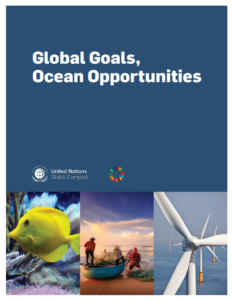Private companies are more and more interested in maintaining and improving the health of the ocean, a new report published by the United Nations Global Compact says. The report was developed in consultation with 300 representatives of business, civil society and academia, and urges that a healthy marine environment is not only necessary for many companies’ long-term operations, but it can also offer significant business opportunities as well.
Climate change is an immediate threat to ocean health, which also experiences pressures due to the over-exploitation of natural resources, habitat destruction, pollution and marine littering.
[smlsubform prepend=”GET THE SAFETY4SEA IN YOUR INBOX!” showname=false emailtxt=”” emailholder=”Enter your email address” showsubmit=true submittxt=”Submit” jsthanks=false thankyou=”Thank you for subscribing to our mailing list”]
According to the new Global Goals, Ocean Opportunities report, addressing these challenges will need significant coordination between Governments and ocean industries as well as their land-based counterparts.
Moreover, private sector innovation and investment, as well as strong public and private governance frameworks, could significantly increase the amount of sustainable resources delivered from the ocean, including healthy food, secure and affordable clean energy, and more efficient and lower-carbon transport.
Furthermore, 30-35% of fish stocks are fished unsustainably, the report says, with an additional 60% being fully fished to the maximum of what can be sustained. Overfishing is a major health risk to much of the developing world, where substitutes for nutritionally rich fish are scarce.
While some collapsed stocks rebound after a moratorium, others have not, something that marks a permanently altered ecosystem and possible loss of economic benefits and livelihoods. Gaps in global governance can lead to displacement of poor behaviour, such as illegal fishing, into areas with limited monitoring or enforcement capacity.
In addition, many threats facing the ocean are transboundary and need cooperation and coordination among diverse states. International governance and regulatory frameworks vary widely across ocean-based industries and lack coherence across sectors.
The need for appropriate governance is becoming even more pressing in the face of modern, more-efficient fishing methods
What is more, innovation could also facilitate the sustainable mining of abundant seabed minerals which are crucial to technologies needed for decarbonizing human activities.
Another important fact is that the consistent implementation and enforcement of international ocean regulations is vital to how ocean industries can meet the Sustainable Development Goals.
Commenting on the report, Lise Kingo, CEO & Executive Director of the UN Global Compact said that:
The UN Global Compact Action Platform on Sustainable Ocean Business has brought diverse companies, civil society organizations and Governments together to find new ways for companies to navigate the ocean challenge, using our Ten Principles on human rights, labour, environment and anti-corruption as their North Star
Regarding ocean-related tourism is a US $134 billion per year growth industry according to the Cruise Lines International Association (CLIA). If managed responsibly, cruising can contribute to the Global Goals through generating economic growth and quality work for all including women and young people. In fact, almost 27 million cruise passengers in 2018 supported an industry paying US$ 46 billion in wages and salaries, according to CLIA estimations.
Moreover, several locations target cruises for tourism growth. Host communities encourage and invest in quays, terminals, facilities, training and destination promotion. However, if left unregulated, poorly planned and weakly monitored cruise tourism can cause less biodiversity, damaged cultural heritage, and overcrowding pressure ashore.
Additionally, the increase in sustainable cruise tourism requires environmentally friendly practices, support for protection of cultural and natural heritage, and tangible economic and social benefits to local people, the report mentions.
In the meantime, Gard was amongst the participants in the launch of the report, with Rolf Thore Roppestad, CEO, commenting that Gard is pleased to be an active participant in the UN Action Platform for the Ocean and to have contributed to this report on sustainable ocean business, with our experts helping to look at the issues around ocean governance.
Launched at the Nor-Shipping 2019 conference in Oslo, the Global Goals, Ocean Opportunities report was developed by the UN Global Compact in cooperation with DNV GL and an editorial board including members of the UN Global Compact Action Platform for Sustainable Ocean Business.
Lise Kingo concluded by saying that the rapid deterioration of ocean health, affects biodiversity, coastal communities and the health of the planet; for these reason it must be urgently addressed. This deterioration is because of human activity, and the business community should have the capacity and competence to solve this problem.
See further information in the PDF below































































